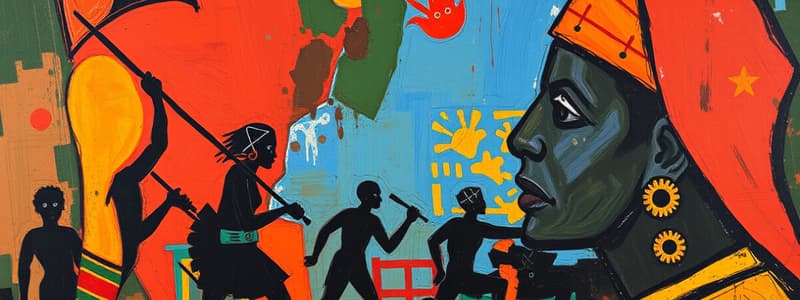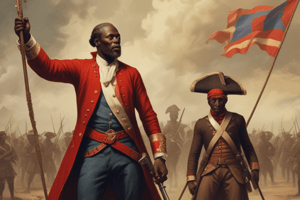Podcast
Questions and Answers
What was the impact of the American Revolution on Haiti?
What was the impact of the American Revolution on Haiti?
- It inspired the slave revolt in Haiti. (correct)
- It ended slavery in Haiti.
- It made slavery legitimate in their constitution. (correct)
- It had no effect on Haiti.
What year did the Haitian Revolution result in the formation of an independent Haiti?
What year did the Haitian Revolution result in the formation of an independent Haiti?
1803
Most slave resistance and revolts in the Caribbean were successful.
Most slave resistance and revolts in the Caribbean were successful.
False (B)
What was the official capital of Haiti?
What was the official capital of Haiti?
What did the Code Noir 1685 law allow white men to do?
What did the Code Noir 1685 law allow white men to do?
How many slaves typically survived the middle passage?
How many slaves typically survived the middle passage?
What did the Haitian Revolution inspire in other parts of the world?
What did the Haitian Revolution inspire in other parts of the world?
The Haitian Revolution was the only anti-colonial rebellion that succeeded.
The Haitian Revolution was the only anti-colonial rebellion that succeeded.
What led to social and political tension between 'whites' and 'blacks' in Haiti?
What led to social and political tension between 'whites' and 'blacks' in Haiti?
Match the following provinces of Haiti to their descriptions:
Match the following provinces of Haiti to their descriptions:
Flashcards are hidden until you start studying
Study Notes
Impact of the American Revolution
- Ideological influence of American Revolution facilitated slave revolt in Haiti.
- Outcome emphasized freedom, yet paradoxically legitimized slavery in the constitution.
- Created justification for inequities in freedom and equality among individuals.
The Haitian Revolution
- Resulted in Haiti’s independence in 1803, becoming the first black-led republic.
- Inspired by the French Revolution and its ideals on freedom and equality.
Slave Resistance and Revolts
- Most revolts were harshly suppressed; successful slave revolts were rare on mainland America.
- Caribbean region experienced significant mass runaways and rebellions.
The Caribbean Islands
- Predominantly French-controlled colonies, which had overpopulated and prosperous plantations.
Haiti
- Known as St. Domingue during the colonial period; divided by Spanish territory (St. Domingo).
- Major economic contributor, producing 40% of Europe’s sugar and 60% of its coffee.
- High slave population, mainly of African origin, with 2/3 being born in Africa.
Northern Province of Haiti
- Home to the commercial capital; significant sailing routes and stronger ties to France.
Southern Province of Haiti
- Most isolated region; connections primarily with neighboring Caribbean ports.
- Contains poorer areas where the free colored population surpassed free whites.
Western Province of Haiti
- Official capital, Port-au-Prince, located here.
- Major plantations for sugar, indigo, and coffee; prevalent slavery.
Code Noir 1685
- French law that aimed to moderate treatment of slaves while ensuring the rights of white masters.
- Established legal structures for marriages and emancipation of mixed-race children, recognizing the complex social fabric.
Slave Life
- Harsh conditions with only one-third of slaves surviving the middle passage.
- Brutal discipline maintained through fear; approximately 300 slaves per plantation.
- Formation of a slave elite through the supervision of 'drivers', leading to revolutionary leadership.
Impact of the French Revolution
- Created a climate of freedom and equality, fostering solidarity among different races.
- Prompted revolutionary actions across racial lines.
Free People of Colour
- Enjoyed respect and full French citizenship, but faced systemic discrimination.
- Laws restricted their rights and opportunities, generating resentment against colonial regulation.
Context for the Revolution
- Poor whites and free people of colour united over grievances during revolution’s initial stages.
- Shrinking opportunities following Quebec's loss fueled common cause among disenfranchised settlers.
- Slaves developed strong inter-plantation bonds which facilitated coordinated revolts.
The Haitian Revolution - What Happened?
- Series of revolts in 1789 sparked by the French and American revolutions.
- Free men of colour participated in revolutionary meetings, advocating for citizenship.
- Successful armed slave revolt began in 1791, leading to mass destruction of plantations and resistance against French troops.
- By 1794, slavery was abolished; Toussaint emerged as a key leader by 1799.
Impact of the Haitian Revolution
- Unique anti-colonial success; established Haiti as the first self-made black republic.
- Triggered abolition of slavery in the French Empire and representation of men of African descent in Parliament.
- Shift in imperial power dynamics, leading to Napoleon’s sale of Louisiana.
- Sparked inspiration for other slave revolts globally and influenced concepts of democracy and human rights.
Studying That Suits You
Use AI to generate personalized quizzes and flashcards to suit your learning preferences.




